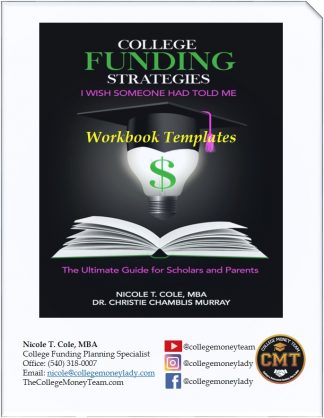 Given the rising cost of college and the uneven economic recovery, there will be a lot more families facing this sort of thing in the coming years. Here are eight things to consider:
Given the rising cost of college and the uneven economic recovery, there will be a lot more families facing this sort of thing in the coming years. Here are eight things to consider:
1.) BE HONEST
Kids should know where they stand. How much have you saved? How much can you spend? How much are you willing to borrow? Sit down and explain it to your high school sophomore or junior. If you don’t know the answers, that’s ok. Explain what the variables are that might affect the outcome. These aren’t always easy discussions. However when you fill out the FAFSA (the application for federal financial aid), your child will need to sign it, and it will include your income and other information. So they will know sooner or later.
2.) DON’T APOLOGIZE
You haven’t saved anything yet. Maybe you have some regrets. Chances are, however, you’ve put a lot of your discretionary money into a nicer place for your family to live, enrichment activities for your kids and family experiences that will create lifelong memories. These are good things. Your children probably do not resent you for them. You certainly don’t owe them an apology, given that you don’t yet know where they’re going to college and what the outcome will be.
3.) APPLY TO A NUMBER OF SCHOOLS
Maybe your child is a good enough dancer to attend The Julliard School. Or there may be a private college out there that’s willing to give him so many grants that the overall cost will fall below what the state university would charge him, even if it’s not Julliard. There’s only one way to know for sure, though, and that’s to apply to as many schools as possible. Include at least a few where a child would be well above average; the schools might be willing to discount generously to attract a handful of special first-year students. Yes, there are application fees for each one, though you can ask for a waiver if money is particularly tight.
4.) GAP YEAR
There is no rule saying that every 18-year-old has to go straight from high school to college. Military service comes with many financial benefits. Other high school graduates live at home for a year and work as many hours as they can to save money for college. Even if they only bank $10,000 in 12 months, that money represents loans they won’t have to take out later. Plus, older students tend to get better grades than 18-year-olds sprung loose from home for the first time. A year of experience may also help with other jobs later.
5.) COMMUNITY COLLEGE
Employers and graduate schools seldom care where you started. If there is a good community college nearby, living at home and starting college there may be a good idea. Make sure from day one you figure out what you need to do to transfer to a top four-year school with your credits intact.
6.) USE YOUR LACK OF ASSETS AS A STUDENT ASSET
Have your child use what they’ve learned from hard work. They may set themselves apart when writing college admissions essays.
7.) SCHOOL LOAN DEBT
Your child will probably need to borrow money to pay for college. You may decide to borrow as well, depending on your situation. If the student needs to borrow more than the maximum amount that the federal student loan program allows each year, then it’s probably too much. Once a student starts borrowing from banks in addition to the
government, the debt from the private lender isn’t eligible for the federal income-based repayment program. That option can keep people out of financial trouble if they’re having problems affording their federal student loan payments.
With parents, it’s a little trickier. The federal government will lend you whatever you need to pay for college costs if you pass a basic credit check. Whether you should borrow, however, depends on how many children you have, how much money you’ll need to retire and how long you can keep working, among other things. Just remember, taking on a lot of new debt is probably not wise.
8.) SEEK ADVICE FROM A COLLEGE PLANNER
Many high schools do not or cannot do a great job giving students advice on picking the right college. Fewer still know a lot about the finer points of financial aid. So you’ll want to turn to a professional for advice. This too may be a bit uncomfortable, but it can get easier to disclose financial particulars to others when your children’s future is at stake.
We are in the business of helping families through the major life transition of sending their children to college. For many, it will be the most expensive time of their lives and, if not handled properly, could cost them their retirement. If you or someone you know needs the help and guidance of a trained financial professional, don’t hesitate to call. Remember, you shouldn’t have to choose between your child’s college and your retirement.







